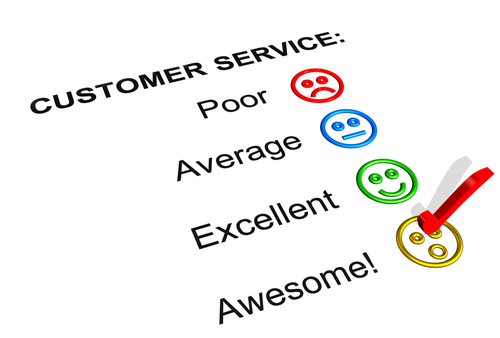
Before you buy any new business software, it’s important to look beyond its features and ‘bells and whistles’. You will want to understand how the product will work in your business, and just as importantly, understand the level of support you will get if you become a customer.
Here are 10 Critical Questions to ask BEFORE YOU SIGN UP. (It’s usually too late afterwards…)
You can't underestimate how important good support can be when adopting a new software platform, especially in the VET sector.
If you're a long term training provider you are well aware of how frequently the reporting requirements, training packages and related technologies change. If you're a start-up or a newly registered training provider you have an even stronger need for good support.
Too many providers focus on the bells and whistles of the software package, and don’t even think about what support they may need. Others take it for granted.
Many software vendors struggle to provide good support. Good, effective and timely support takes money, commitment, the right skills and attributes, training and a lot of hard work to deliver.
So the next time you hear a software vendor waxing lyrical about the amazing features of their latest software release, ask this simple question. "If I proceed with your product, how will you support me?"
If the answer is vague and glib, be wary. Also be wary if the answer seems to be exactly what you want to hear – but is short on the details.
Good support is not something a vendor can just tack on at the last minute. It requires design, planning and continuous improvement. And that requires a long term commitment on the part of the vendor. Is it worth it? We think so.
The number one reason training providers come to Bluegem is because they did not feel supported by their last vendor.
Having spent the last 25 years in the business of providing business software solutions, Bluegem has learned that, in the long run, good support will win out over nice-to-have features every time. (Of course, you also need to have a fundamentally good or great software product to also have really happy customers.)
Sounds obvious right? It’s not. Most business simply assume the vendor will support them without ever establishing the facts. Most businesses have their list of features, wants and wishes. Often this is listed by the “Must-haves” (Essential Features) and the “Nice-to-haves” (Desirable Features). The next time you're in the market for any software, and particularly a Training Management, Learning Management or Student Management System for your business, please add these 10 Critical Questions as high priorities to your list of Essential “Must-haves”. You’ll make a better selection decision and get better results for your business. And you’ll end up sleeping much better at night.
1. Is your organisation committed to helping my business obtain the most out of your software?
An organisation that has a commitment to support its clients will be able to articulate that commitment with published documents and details about what type of support is offered and when, the steps and avenues to obtaining support and whether or not support is included or extra. If the vendor is vague on this question, chances are they haven't really thought much about how they plan to support you. And in an environment where regulatory reporting changes happen frequently, you will absolutely need that support.
2. How do I access YOUR help and support services?
A vendor who is serious about supporting you will make it easy for you to access their support systems. As well as one-on-one and phone support, they will offer a ticketed Help Desk system that operates 24/7. This type of system will allow you to explain your issue in a way that demonstrates accountability and progress towards a satisfactory resolution. It takes time and investment to staff and maintain an effective help desk. Vendors that don't offer it are generally not serious about the quality of their support.
3. Do you provide training?
The glib and trite response to this question often comes in a form something like: "No need for training. Our software is so easy to use a monkey could learn it in 5 minutes". Well the truth is 5 different monkeys might learn to use it in five minutes, but there's a high likelihood they'll use five different approaches and come out with at least five different sets of results. It's really important that the software is user friendly and easy to use. No question. But this is not about ease-of-use. A good software training program ensures that all your users get optimal value from the system in a consistent and repeatable manner.
4. Does the software come with a user manual and other forms of self-help?
Software without user manuals, online help, a video library, FAQs and tutorials takes away your access to self-help. You don’t just want your software vendor to bail you out over the phone if you have a problem. Most clients want the assurance of knowing they have 24/7 access to tools that enable them to help themselves when they can.
5. How do you cater for different levels of help and support?
As you know, different people have differing learning needs and modes of learning. Some very smart people struggle more than others with technology and need extra support. But once they've 'got it', you hardly ever hear from them again. Some clients learn better by using manuals and online tools in their own time, others prefer to learn during training with a skilled and knowledgeable presenter and others learn by using guided tutorials.
Since most software vendors in the VET sector deliver nationally, it’s important to work with a vendor who has invested in effective online support tools that offer all support at all levels and modes of delivery.
Online tools like Citrix GoTo Meeting make virtual classrooms a great experience for learning and hands-on training when face-to-face on-site support is not possible or practical.
6. How often do you update and maintain your software?
This question is particularly important in the VET Sector. Training Management, Learning Management or Student Management systems that are not maintained and updated at least half yearly will inevitably cause you problems.
In the last 5 years alone at a national level we have seen AVETMISS 7 move to 8, SNR move to SRTO 2015, the introduction of USI and now the USI CAA , VET FEE HELP reporting requirements changed to VET Student Loans, CCOS was made redundant and much more..
Then we can multiply those changes by 3 to cater for new outcome and funding codes, and reporting changes at state level.
It’s more complex when you add in technology changes relating to security threats, NBN, Online Learning Standards, Payment Gateway security, email spam blockers, and the ongoing evolution of Web Browsers such as Edge, Chrome, Safari and FireFox (if you are using Internet Explorer you might want to jump ship).
As a cornerstone of your support program, in today's world and in this training industry, it is vital you work with a vendor who is supporting you through all this ongoing change.
7. How will you support me to migrate my existing records to your system?
If you are running accredited courses and reporting to RAPT, your STA with their version of AVETMISS or directly to NCVER, there is no reason why your data can't be easily and cost-effectively migrated to another 'compliant' vendor.
RAPT and AVETMISS produce your data in standard formats that should be easily importable to another system. This should never be an expensive exercise as long as the vendor has built data migration into its support framework and developed the necessary tools to read RAPT and AVETMISS files.
Unless you are a non-RTO delivering a large volume of non-accredited training, your AVETMISS / RAPT files carry at least 80 to 90% of the data you will need to migrate. Because they are open and published standards, reputable vendors will have developed the necessary import functions and automated the data migration process for you.
For those Non-RTOs or providers who deliver a large quantity of non-accredited training, that same reputable vendor would be able to provide you with templates that you can export your data into, ready for import into their systems.
Expensive and labour-intensive data migration projects should be a thing of the past. A good support program recognises data migration is a common requirement for clients looking to change their system. It needs to be easy, and it does not need to be expensive.
8. How will you advise me of changes and updates in your software?
Every good software provider updates and maintains their software periodically. Prior to release, you would expect the opportunity to request and suggest improvements and have access to a road-map showing the vendor’s planned improvements.
For each release you should expect a pre-release note identifying changes, an invitation to ask questions, additional training where appropriate, updated self-help tools and most importantly; consultation with you about when to start and when to complete the deployment of the latest update.
You would also expect the vendor to assure you the latest release had been fully tested before deploying it to your production environment.
9. What if the unthinkable happens, the system fails and I lose all my data?
A good vendor will give you confidence that your data is backed up at least weekly and that your system can be recovered from scratch within an hour. This would be a basic standard, and you may want more frequent backups if necessary. But there's more to this than disaster recovery and backups. These days you absolutely must consider security, privacy of information, and if you're in the VET sector, support for AVETMISS reporting errors, particularly when your funding depends on accurate and timely reporting.
10. How will you support me during that crucial first month after adopting your software?
There's no doubt. Suitable training followed up with intense proactive support when your team first uses your new software will translate to self-reliance, confidence, productivity and great results for many years to come.
Importing and migrating your data is just the start. Most software needs to be set up with options, configuration settings and initial data. For a web presence you'll also need to consider branding and the way your product presents to your clients and staff.
A vendor that focuses on getting you started on the right foot is most definitely thinking about your best interests. But I have to tell you, this is also an act of self-interest on the part of the vendor. A confident and well trained customer will be a much happier customer – and far less likely to lean on the vendor’s support resources in the long term.
When you are making your list of Essential Requirements for your new software, please remember to ask these 10 Critical Questions. And listen carefully to the responses.
You can’t take good support for granted. Check in advance before you buy. You’ll end up with much better results and you’ll sleep better at night too!

